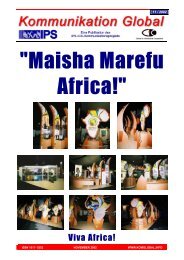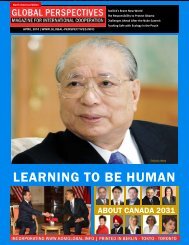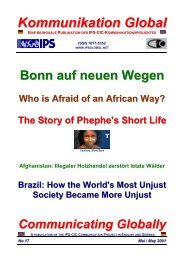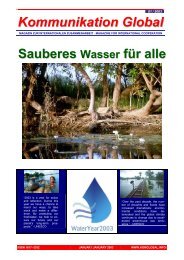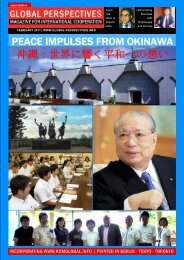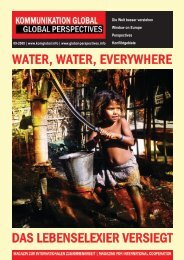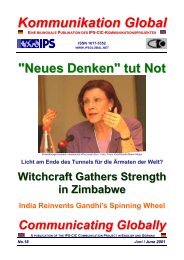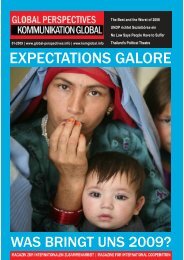GLOBAL PERSPECTIVES | Second Quarterly 2013 â North America ...
GLOBAL PERSPECTIVES | Second Quarterly 2013 â North America ...
GLOBAL PERSPECTIVES | Second Quarterly 2013 â North America ...
You also want an ePaper? Increase the reach of your titles
YUMPU automatically turns print PDFs into web optimized ePapers that Google loves.
<strong>GLOBAL</strong> <strong>PERSPECTIVES</strong> - SECOND QUARTERLY <strong>2013</strong><br />
<strong>PERSPECTIVES</strong><br />
Creating New Values Through Gift Economies<br />
By David Andersson*<br />
This is the text of a presentation at a workshop – 'Turning a Crisis into an Opportunity: Humanizing the Economy'<br />
– organised on June 18 by IDN partner Pressenza International Press Agency at the Deutsche Welle Global Media<br />
Forum <strong>2013</strong> in Bonn. It is being reproduced by arrangement with Pressenza.<br />
Gift economies could be very potent and<br />
effective organizing tools for creating<br />
value. We have many examples of gift<br />
economies in our world today, such as<br />
community gardens or free/open software,<br />
where no money is paid for the<br />
creation and maintenance of this resource<br />
but instead people contribute time and<br />
talent and get recognition and respect as<br />
well as shared access to the resources .<br />
Other examples include the Time Dollar<br />
community, where people give their time in exchange for<br />
services or goods, and the donation system (such as blood<br />
donations). It sometimes confounds economists who think<br />
that rational self-interest in a cash economy is the only way<br />
to create value, but it is clear to see in the internet that<br />
sharing is happening all the time: Wikipedia, social networking<br />
communities, collaborative websites and archives<br />
like the Internet Archive website, the blogosphere community,<br />
and of course the Linux operating system with tens of<br />
millions of volunteers around the world who add to its<br />
design without the apparatus of the corporate world. Linux<br />
is ported to more computer hardware platforms than any<br />
other operating system.<br />
The creative world also has developed a Common License<br />
mechanism removing money exchange and opening accessibility<br />
for music, photos, videos, software, and scientific<br />
and educational materials under the Creative Common<br />
License. The Creative Commons organization has the following<br />
goal: “Our vision is nothing less than realizing the<br />
full potential of the Internet — universal access to research<br />
and education, full participation in culture — to drive a<br />
new era of development, growth, and productivity.” It has<br />
grown from under 1 million works in its the first year to<br />
over 400 million at the end of 2010.<br />
GlaxoSmithKline (GSK), for example, is a major pharmaceutical<br />
company that has surrendered all copyrights in its<br />
malarial data set, which includes more than 13,500 compounds<br />
known to be active against malaria:<br />
By making this information publicly available, GSK hopes<br />
that many other scientists will review this information and<br />
analyse the data faster than we could on our own. Hopefully,<br />
this will lead to additional research that could help drive<br />
the discovery of new medicines. We would also encourage<br />
other groups, including academics and pharmaceutical<br />
companies, to make their own compounds and related<br />
information publicly available.This is<br />
essentially an example of ‘open source’<br />
being applied to drug discovery. We<br />
know that data increases in value<br />
when connected with other data and<br />
that the more eyes looking at a problem,<br />
the more potential solutions may<br />
arise.<br />
The interesting part of gift economies<br />
is that it releases energy, ideas and<br />
commitments that the market economy,<br />
with its legal contracts and focus on accumulation of<br />
money, often can’t. Giving economies have a sense of mutual<br />
commitment and trust, they promote openness, the<br />
sharing of information, and are socially very satisfying and<br />
build community. The challenge is to recognize that we<br />
have such systems already and should give them respect as<br />
coherent value-generating systems.<br />
It's worth recalling the bold vision of James Quilligan – an<br />
analyst and administrator in the field of international development<br />
since 1975 – for re-inventing nation-states and<br />
international relations through commons-based governance:<br />
“The solution does not rest with the sovereign club of<br />
nations or with the club of the world’s elite banks and corporations.<br />
It rests with the people and our ability to create<br />
political accountability for the management and production<br />
of our commons. It involves our ability to create the<br />
new structures that will support sustainability and sharing.”<br />
Quilligan has also collaborated with several United Nations<br />
agencies as well as international development organizations<br />
on global commons issues and has served as an economic<br />
consultant for government agencies in 26 nations.<br />
Quilligan is presently Managing Director of the Center for<br />
Global Negotiations and Chairman of Global Commons<br />
Trust.<br />
*David Andersson is currently the Director of the New York<br />
City chapter of the Humanist Party (HP), member of 'Making<br />
Worlds: a Commons Coalition', a collaborative effort by Occupy<br />
Wall Street to explore the utility of the commons in<br />
creating a better world and the coordinator of the New York<br />
Coalition to Expand Voting Rights (Ivote NYC), Before forming<br />
the HP in 2009, David Andersson was the Director of<br />
Special Campaigns at the Center of Cultures for more than<br />
10 years and co-founded the Diversity Center of Queens in<br />
Jackson Heights. [IDN | June 26, <strong>2013</strong>] <br />
- 13 -



